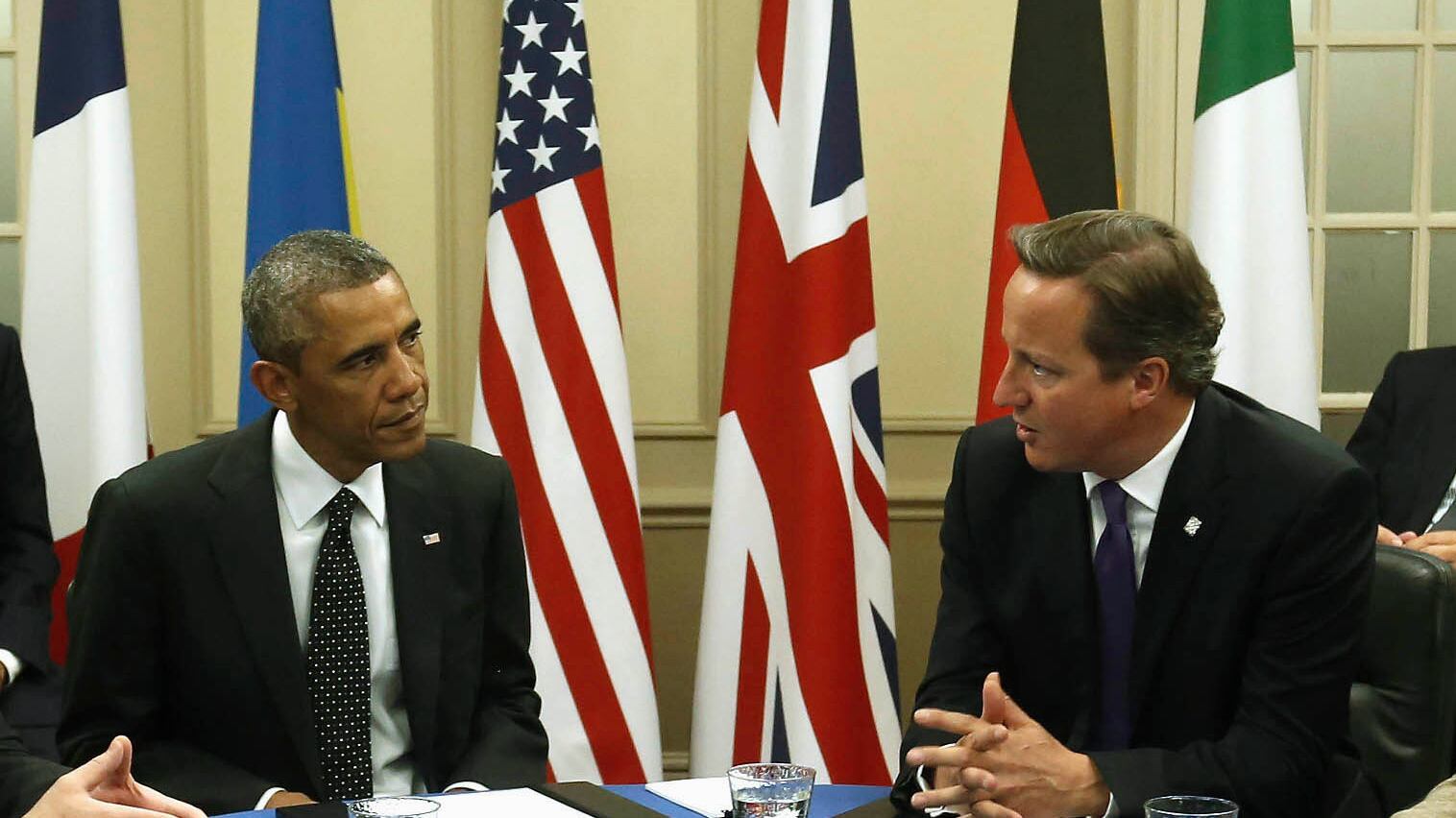You know that the fundamentals of the Brexit argument are a bit shabby when its main domestic proponent resorts to racism to refuse the president of the United States.
When Barack Obama visited London in April and published a comment piece in the pro-Tory Daily Telegraph outlining the U.S. interest in Britain’s continuance in the European Union, former London mayor Boris Johnson took to the pages of the right-wing, Poujadiste Sun tabloid to channel Dinesh D’Souza and Donald Trump. “Some said it was a snub to Britain,” the tow-headed Johnson remarked, of the president’s intervention. “Some said it was a symbol of the part-Kenyan president’s ancestral dislike of the British empire—of which Churchill had been such a fervent defender.”
As Nick Cohen, a dissenting contributor to the pro-“Leave” Spectator, observed, the weaselly evasion here—“some said”—did nothing to mask the sinister innuendo Johnson was resorting to in suggesting that a black man of African ancestry had no business intruding in a strictly Anglo affair, even if he was leader of the free world. Cohen also might have added that Winston Churchill was himself half American, had no such compunction about involving his mother’s homeland in World War II, and went to his end a loud proponent of the “special relationship,” to which Obama was explicitly appealing in asking London not to forfeit its place as America’s foremost ally in Brussels.
Brexit, as it happens, is the business of the United States because it has a direct bearing on our national security, as a host of former and current military and intelligence officials have attested in recent months. Latest to join this chorus is NATO Secretary General Jens Stoltenberg, whose native Norway is not in the European Union but who nevertheless has twinned the cohesion of a supranational government to the alliance he leads. “To fight the terrorist threat we need both the EU and Nato and we need stronger cooperation between Nato and the European Union,” Stoltenberg told the Guardian on Wednesday, on the eve of the U.K. referendum.
Earlier, the director of Europol, Rob Wainwright, highlighted the threat to Britain from jihadism that would result from Britain’s exit from the EU at a time when multiple security services are overtaxed to monitor the to-and-fro flow of ISIS foreign fighters and CIA Director John Brennan has emphasized that two years of attritional war have done nothing to diminish the caliphate’s capacity for conducting terrorism in the West.
“If you take away that infrastructure that [the British police] have helped to design over the past 40 years,” Wainwright said at a press conference at Europol headquarters in The Hague several months ago, “it would make the United Kingdom’s job harder to protect citizens from terror.” Britain is not a part of the visa-free Schengen zone but, as an EU member, it continues to have access to the Schengen information system and is part of a common European Arrest Warrant protocol, which makes it easier to grab suspects who have previously slipped seamlessly between continental borders and wound up at Heathrow, St. Pancras, or Portsmouth.
But what are a few beheadings or car bombings in the face of putting an end to the apocryphal tyranny of misshapen bananas and hidden barmaid tips?
Notably, a bevy of sensible critics of the EU on the British and European center-right have come out for “Remain” because they appreciate the exorbitant costs of a nasty and untimely divorce coinciding with what is arguably the most volatile period for international security since the 1930s.
One of the shrewdest of these voices is Dalibor Rohac, a Slovakian-born, Hayek-quoting libertarian political scientist now ensconced at the American Enterprise Institute. In his newly published book, Towards an Imperfect Union: The Conservative Case for the EU, Rohac notes that with Washington’s pivot to Asia and continuing calamity in the Middle East, the United States “can no longer be expected to continue to play the same role that it did throughout the Cold War.”
And yet there is no obvious national successor prepared to inherit this mantle—a long desired outcome of both the more vituperative Europeanists such as Horst Teltschik, the foreign policy adviser to former German chancellor Helmut Kohl, who openly stumped for “having a counter-weight to the USA,” and the more parochial Little Englander Euroskeptics such as UKIP’s Nigel Farage, who admires Vladimir Putin and sounds like Philip Larkin without the irony or wit.
Meanwhile, a revanchist Moscow has gobbled up European territory in the last two years and not so subtly threatened the invasion or irradiation of NATO states. As bad as the current climate is, what impact would exclusively British or German or French sanctions have had on Russia’s behavior in Ukraine as against economic penalties implemented and renewed jointly by 28 countries?
The EU is now doing more to combat Russian disinformation than the U.S. State Department because it rightly recognizes elaborate lies about fascist juntas banning Cyrillic in the Baltics or marauding, gang-raping Muslim migrants in Berlin are imminent social and political dangers.
“The Kremlin’s influence in Central and Eastern Europe has flourished thanks to clever energy policy, covert bribes and attempts to coopt political elites, and skilled propaganda,” Rohac writes. “NATO does not have the tools to respond to these threats. No military alliance can ‘defeat’ the corruption of the political class by Russian money, nor can it change an intellectual climate that is hostile to liberal democracy. And neither have European countries, acting alone, been particularly effective in responding to these challenges.”
The more metaphysical aspects of Britain’s EU membership—the mutual trust it establishes with other member states—cannot be discounted either. Will British soldiers really commit themselves to being in harm’s way to defend another European country on their periphery, post-Brexit? And could the U.K. do so if withdrawing from the single market led to British recession? When then of the U.K.’s spending commitment of 2 percent of its GDP on defense efforts, which NATO and the United States might need to rely on once again, sooner rather than later?
Absent a prominent platform in Brussels, does London really want to resort to older and more anemic sodalities such as the Organization of Cooperation and Security in Europe (which has done little but “monitor” Putin’s violation of the Minsk II treaty in the Donbas) or the Council of Europe, which has become a Star Wars cantina for shady lobbying efforts and infiltration by kleptocratic and undemocratic regimes that did not deserve membership in the first place? Few in Washington want to see this happen.
Still another conservative “Remain” pragmatist is Economist editor (and Daily Beast contributor) Edward Lucas, who argues that Britain’s pro-American role in the EU is particularly important in furthering the common goal of energy and cyber security. Britain, he says, is a “cyber superpower” and guarantor on trans-Atlantic data sharing within Brussels. Also, it can do what America can’t, such as “make Lithuania gain energy independence” and lead a collaborative “assault on Gazprom's coercive economic practices,” which Lucas says “has done more than any NATO contingency plans.”
Furthermore, Britain has a solid record of pushing back against the protectionism of its fellow member-states, which has a direct bearing on the U.S. economy. “When the French and Germans say they don’t want U.S. tech giants in Europe,” Lucas said, “Britain is a safe harbor. Europeans are trying to use privacy as a closet protectionist policy.” There is little reason to count on this largess continuing if Brexit goes through. U.S. Trade Representative Michael Froman has stated that there’s “no [free-trade agreement] with the U.K. so they would be subject to the same tariffs— and other trade-related measures—as China, or Brazil or India.”
Perhaps Labour leader Jeremy Corbyn would be happy to spend the next few years elevating Britain’s economic status in America to that of the BRICs. But would David Cameron, or, if Brexit does come off, his Churchill-besotted heir apparent, Boris Johnson?






